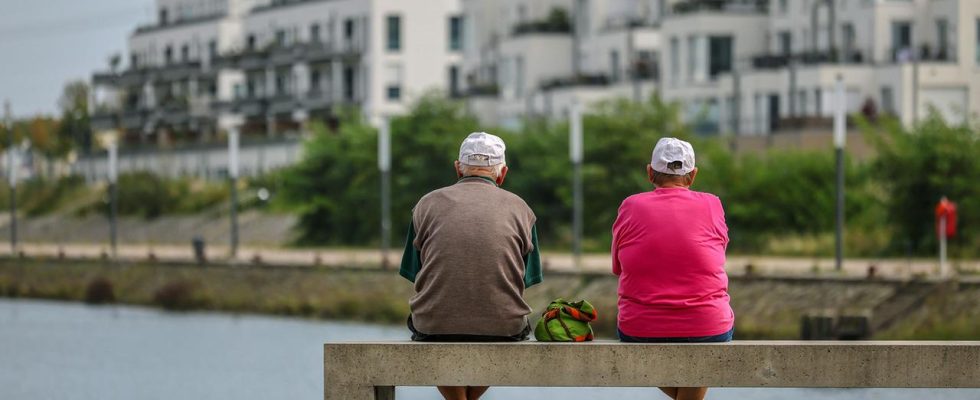analysis
A majority in Germany still wants to live in their own home. What is behind this wish? And is it even worth buying compared to renting?
In no other country in the EU are there as few homeowners as in Germany – less than half of all Germans lived in their own four walls in 2022. The desire is completely different: according to surveys, almost three quarters of all tenants have the need for their own property.
There are financial reasons behind this, but also motives such as security and creative freedom. In a survey by the German Economic Institute, the Allensbach Institute for Demoscopy and Consult GmbH on behalf of the Sparda banks, a majority of the more than 1,000 respondents were of the opinion that buying a property was worth it.
Securing the standard of living in old age
The topic of retirement provision in particular plays an important role for many people when considering the potential purchase of real estate. In order to maintain the standard of living achieved before retirement even in retirement, private pension provision is becoming increasingly important alongside company and statutory pension provision.
Because the statutory pension is significantly lower than the last salary. The pension level in Germany is currently around 50 percent of the average income. Anyone who makes private provision for old age can do so through funds, ETFs or the Riester pension – or even through real estate. The idea is that you can ultimately live rent-free in your own four walls in old age.
For many tenants, the question arises as to whether the rent money should be used to pay off a real estate loan. True to the motto: “I would rather pay off 1,000 euros every month for a loan than transfer 1,000 euros to my landlord every month – and end up with nothing from it.” But is this assumption actually true?
A study by the research institute Empirica from 2022 looked at the topic of who is actually better off when they retire: tenants or owners. The results of the survey of 50 to 59 year olds with a net income between 1,700 and 2,300 euros were pretty clear. Owners had more than five times as much net worth as tenants. These had net assets of 36,000 euros, while owners had 190,000 euros.
In addition, the homeowners were even ahead when it came to financial assets – i.e. what was in the account and not in the property. Owners in the same income group had financial assets of just under 52,000 euros, tenants only over 31,000 euros.
Real estate triggers “positive compulsory savings contract” out of
Even if such figures should be viewed with caution because they only reflect the cases in which the property purchase was successful and exclude many other factors: One reason why owners are often wealthier in old age is that paying off a home loan requires a lot of discipline . A real estate loan is a type of positive compulsory savings contract.
The fear that the bank will take back the newly built or purchased home is a great motivation to “save” enough to pay off the loan. Homeowners have to pay their loan installments to the bank every month. In return, owners are willing to make sacrifices and pay more attention to prices when it comes to their expenses. And this is noticeable in the difference in wealth between property owners and tenants.
“Ultimately, I have to be aware – if my name isn’t Krösus – that the first ten years will probably be hard and that I will have to refrain from consuming,” says financial book author Gerd Kommer in the podcast “Gold & Asche: Project Hauskauf”. ARD financial editorial team. “That I can’t go on vacation to the Maldives, that I can only afford a small car, that I just have to save money.” This is especially true in the first ten years because household income is often lower during that time.

Podcast “Gold & Ash: House Purchase Project”
In the first season of “Gold & Asche” the ARD financial editorial team The most important things when buying a house are examined step by step in seven episodes – with background information and expert knowledge. You can hear it in the ARD audio library and wherever podcasts are available. The individual episodes You will find here.
Episode 1: Is it worth buying a house? (21st of February)
Episode 2: The Right Time to Buy a Home (February 21)
Episode 3: How much house can I afford? (February 28)
Episode 4: What do I have to pay attention to when getting a loan? (6th March)
Episode 5: How the state provides financial support for buying a house (March 13)
Episode 6: Everything about energy renovation (March 20)
Episode 7: Was everything better before? (27th of March)
Phenomenon of “lifestyle inflation”
Tenants are also obliged to pay their rent on time every month. However, you usually don’t have to go to extremes financially in order to be debt-free as quickly as possible – at the latest by retirement. This also includes owners making special repayments if there is something left over.
In comparison, a tenant can voluntarily invest his disposable income in the capital market in addition to rent and essentials. But very few people are so disciplined without coercion.
This phenomenon is also known as “lifestyle inflation” or “lifestyle creep”: You earn more and could theoretically save the money or invest it in the capital market, but instead you simply spend more. The tenant can afford this “extra” consumption, but this also comes at the expense of his assets.
Rent is not comparable to the loan installment
Owners can therefore, on average, have more wealth than tenants in old age. However, the comparison between the monthly rent and the loan installment to the bank is flawed: This assumes that the tenant’s monthly burden is the same as that of an owner. In order to achieve a correct comparison between tenant and buyer, all of the homeowner’s costs must be included in the calculation.
On the one hand, tenants pay the rent, which does not go towards building their assets, but on the other hand, they do not bear any risk at all, as Niels Nauhauser from the Baden-Württemberg Consumer Center told the ARD financial editorial team explained. If something breaks, needs to be repaired or maintained, the tenant doesn’t pay for it. The owner, on the other hand, has to calculate in the long term “that the entire residential property will – let me put it casually – be broken in 50 years,” says Nauhauser.
Maintenance costs depending on condition or size
In order to maintain the value of your own property, money must be set aside for renovation and maintenance costs in addition to the monthly loan installment. Consumer advocate Nauhauser expects around two percent of the building’s value per year. For a 400,000 euro property, that could mean a good 8,000 euros a year – or around 670 euros a month, which would also have to be put aside. Other estimates are based on values such as square footage or age.
The rent cannot therefore be directly compared with the loan installment; most likely with the interest payments including acquisition and maintenance costs and all other ongoing costs. Ultimately, the interest payments do not go into retirement provision, but rather to the bank. And the maintenance costs, which do not serve to increase value but rather to maintain the property, go to tradesmen or insurance companies, for example.
Good retirement provision?
A property is basically a good retirement provision if the conditions for the purchase – such as sufficient equity – are met, says Kommer. “It’s a good form of retirement planning, but it doesn’t have to be the best and it’s certainly not the only good one.”
Niels Nauhauser from the consumer advice center also emphasizes that the property can be a profitable precaution, but it doesn’t have to be. If you look back in the long term, many asset classes are more profitable than real estate.
Protection from expulsion
In addition to retirement provision, security is also an important reason for many people to own their own property. Homeowners don’t have to worry about whether their apartment will be evicted for personal use. The German Tenants’ Association estimates – because there are no official figures for this – the number of terminations for personal use of rental apartments at just under 80,000 per year.
However, that is a small number when you consider that there are more than 40 million apartments in Germany. The probability of having the apartment terminated is well below one percent. But of course the risk is permanent.

